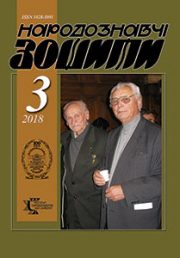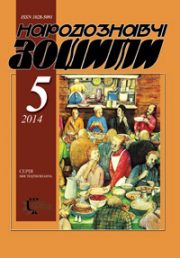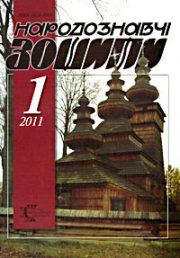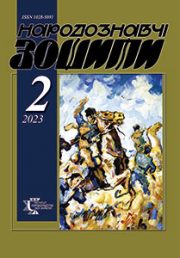The Ethnology Notebooks. 2022. № 6 (168), 1300—1331
UDK 930.2:[398.4(477.51)
DOI https://doi.org/10.15407/nz2022.06.1300
HALAICHUK Volodymyr
- ORCID ID: https://orcid.org/0000-0001-7780-5876
- Doctor of Science in the field of History,
- Professor of the Department of Ethnology,
- Ivan Franko National University of Lviv,
- 1, Universytetska Str., 79000, Lviv, Ukraine,
- Contacts: e-mail: halay_czuk@ukr.net
Abstract. Statement of the problem. Demonology, worldviews and beliefs still remain vivid manifestations of the spiritual culture of Eastern Polissia. Despite the relatively good coverage of this topic on the pages of specialized scientific and local history publications, certain areas are little known in this context for researchers and a wide range of readers. In particular, this applies to the Semenivsky district of the Chernihiv region.
The purpose of the research is to introduce into scientific circulation, systematize and analyze a mass of information about the demonological and worldview ideas and beliefs of Semenivshchyna, which the author recorded in August 2019.
Traditional ideas about mermaids, hobgoblin and witches are considered.
The article presents a wide array of materials about people who seem to possess magical powers. Among them were those who were able to stop a fire, heal from a disease or snake bite, predict the future, etc. Instead, there were those who did harm: they tied magic knots on grain, took milk from cows, etc.
Demonological ideas related to the dead are considered: the belief that the deceased can «take away» something from the household after death; magical use of funeral attributes; ideas about suicides and dead children without baptism.
Samples of demonological and philosophical ideas about animals and plants, natural objects and phenomena are given: in particular, about a weasel and a snake, an aspen, trees with anomalies, the sun, thunder, drought, a whirlwind, etc.
It has been established that worldview and demonological ideas and beliefs from Semenivshchyna are based on the all-Polissian and, more broadly, on the all-Ukrainian basis, and at the same time contain a number of original fragments. Among these: a request to the hobgoblin to be kind to livestock; local options for inviting a hobgoblin to a new home; stories about how a witch jumps out on the shoulder of a night passerby; the idea that when the late snow falls, it is «the goddess shakes out the feather», and that when it thunders, it is «Thunderbolt is coming», etc.
The expediency of further ethnographic studies of Eastern Polissia has been determined.
Keywords: Eastern Polissia, demonology, worldviews and beliefs, mermaid, hobgoblin, witch, souls of the dead.
Received 8.11.2022
RЕFЕRЕNCЕS
- Britsyna, O., & Holovakha, I. (2004). Prose folklore of the village of Ploske in Chernihiv Region: Texts and explorations. Kyiv [in Ukrainian].
- Vinogradova, L.N., & Levkiyevskaya, Е.Е. (Eds.). (2010, 2012. 2016, 2019). Folk demonology of Polissya: publication of texts in records of the 80—90 s. twentieth century (Vol. 1: People with supernatural powers; Vol. 2: Demonologization of dead people; Vol. 3: Mythologization of natural phenomena and human states; Vol. 4: Spirits of home and natural space. Non-localized characters (Studia philologica). Moskva [in Russian].
- Halaіchuk, V. (2019). Demonology of Chernihiv Region (Based on field materials from Chernihiv District). Folk culture of the Chernihiv district (tradition and modern living conditions) (Pp. 154—168). Zhytomyr [in Ukrainian].
- Halaіchuk, V. (2022). Demonological and worldwide ideas and beliefs of the polishchuks of Chernihiv region (According to field materials from Semenivsky district). The Ethnology notebooks, 5 (167), 1092—1120 [in Ukrainian].
- Halaіchuk, V. Materials on the topic «Traditional worldviews and demonology», recorded in the Semenivskyi and Novgorod-Siverskyi districts of the Chernihiv region 25.07—07.08.2019, filе V. Halaychuk-2019. Arkhivе DNСZKSTK [in Ukrainian].
- Halaіchuk, V. (2020). Traditional demonological ideas of Ukrainians about household spirits: monograph. Lviv [in Ukrainian].







